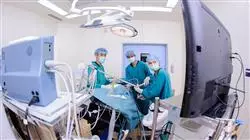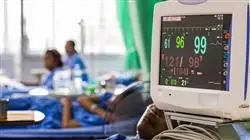University certificate
Scientific endorser

The world's largest faculty of nursing”
Introduction to the Program
A comprehensive and 100% online program, exclusive to TECH, with an international perspective backed by our membership in the National League for Nursing"

Operating Room Nursing is an essential specialty within healthcare, responsible for providing specialized care to patients before, during, and after surgical procedures. In this environment, professionals must have advanced preparation and technical skills to ensure not only patient safety but also a quick and effective response to high-complexity situations. Given the constant advancements in surgical techniques and medical technology, it is essential for nurses to stay updated with the latest developments in this field.
To meet this demand, TECH has developed this Advanced master’s degree in Operating Room Nursing, which will provide the necessary tools to lead and manage surgical procedures with excellence. Through a comprehensive academic approach, the program will cover everything from preoperative preparation and operating room management to postoperative monitoring, as well as managing high-tech equipment and risk management. Additionally, professionals will learn to apply advanced surgical protocols, sterilization techniques, and emergency management, all with a focus on patient safety and well-being.
Moreover, the university program will be delivered 100% online, offering flexibility and accessibility for those who wish to balance their work with their studies. Thanks to the Relearning methodology, graduates will be able to continuously review and reinforce key concepts, ensuring deep and lasting comprehension. In conclusion, TECH will allow you to advance in your professional development in a comfortable and effective manner, with content accessible at any time and from any device, regardless of your location.
As a member of the National League for Nursing (NLN), TECH offers students access to assessment tools, digital libraries, webinars, and conferences focused on nursing educational excellence. This membership promotes faculty development, engagement with leading experts in the field, and the opportunity to join high-impact academic and clinical networks.
With this Advanced master’s degree, you will prepare to be part of the forefront in the Surgical field, combining science and technology. What are you waiting for to enroll?"
This Advanced master’s degree in Operating Room Nursing contains the most complete and up-to-date scientific program on the market. The most important features include:
- The development of practical cases presented by experts in Operating Room Nursing
- The graphic, schematic, and practical contents with which they are created, provide scientific and practical information on the disciplines that are essential for professional practice
- Practical exercises where self-assessment can be used to improve learning
- Special emphasis on innovative methodologies in Operating Room Nursing
- Theoretical lessons, questions to the expert, debate forums on controversial topics, and individual reflection assignments
- Content that is accessible from any fixed or portable device with an internet connection
You will continually improve your professional practice with the most advanced scientific and technical knowledge in Surgical Nursing”
It includes a faculty composed of professionals from the Operating Room Nursing field, who bring their work experience to this program, alongside renowned specialists from leading societies and prestigious universities.
The multimedia content, developed with the latest educational technology, will provide the professional with situated and contextual learning, i.e., a simulated environment that will provide an immersive learning experience designed to prepare for real-life situations.
This program is designed around Problem-Based Learning, whereby the student must try to solve the different professional practice situations that arise throughout the program. For this purpose, the professional will be assisted by an innovative interactive video system created by renowned and experienced experts.
This Advanced master’s degree will not only prepare you for the operating room but will also open doors to new opportunities for professional and personal growth”

You will acquire the necessary tools to face the challenges of the operating room and enhance the patient experience, all in a 100% online format”
Why study at TECH?
TECH is the world’s largest online university. With an impressive catalog of more than 14,000 university programs available in 11 languages, it is positioned as a leader in employability, with a 99% job placement rate. In addition, it relies on an enormous faculty of more than 6,000 professors of the highest international renown.

Study at the world's largest online university and guarantee your professional success. The future starts at TECH”
The world’s best online university according to FORBES
The prestigious Forbes magazine, specialized in business and finance, has highlighted TECH as “the world's best online university” This is what they have recently stated in an article in their digital edition in which they echo the success story of this institution, “thanks to the academic offer it provides, the selection of its teaching staff, and an innovative learning method aimed at educating the professionals of the future”
A revolutionary study method, a cutting-edge faculty and a practical focus: the key to TECH's success.
The most complete study plans on the university scene
TECH offers the most complete study plans on the university scene, with syllabuses that cover fundamental concepts and, at the same time, the main scientific advances in their specific scientific areas. In addition, these programs are continuously being updated to guarantee students the academic vanguard and the most in-demand professional skills. In this way, the university's qualifications provide its graduates with a significant advantage to propel their careers to success.
TECH offers the most comprehensive and intensive study plans on the current university scene.
A world-class teaching staff
TECH's teaching staff is made up of more than 6,000 professors with the highest international recognition. Professors, researchers and top executives of multinational companies, including Isaiah Covington, performance coach of the Boston Celtics; Magda Romanska, principal investigator at Harvard MetaLAB; Ignacio Wistumba, chairman of the department of translational molecular pathology at MD Anderson Cancer Center; and D.W. Pine, creative director of TIME magazine, among others.
Internationally renowned experts, specialized in different branches of Health, Technology, Communication and Business, form part of the TECH faculty.
A unique learning method
TECH is the first university to use Relearning in all its programs. It is the best online learning methodology, accredited with international teaching quality certifications, provided by prestigious educational agencies. In addition, this disruptive educational model is complemented with the “Case Method”, thereby setting up a unique online teaching strategy. Innovative teaching resources are also implemented, including detailed videos, infographics and interactive summaries.
TECH combines Relearning and the Case Method in all its university programs to guarantee excellent theoretical and practical learning, studying whenever and wherever you want.
The world's largest online university
TECH is the world’s largest online university. We are the largest educational institution, with the best and widest online educational catalog, one hundred percent online and covering the vast majority of areas of knowledge. We offer a large selection of our own degrees and accredited online undergraduate and postgraduate degrees. In total, more than 14,000 university degrees, in eleven different languages, make us the largest educational largest in the world.
TECH has the world's most extensive catalog of academic and official programs, available in more than 11 languages.
Google Premier Partner
The American technology giant has awarded TECH the Google Google Premier Partner badge. This award, which is only available to 3% of the world's companies, highlights the efficient, flexible and tailored experience that this university provides to students. The recognition as a Google Premier Partner not only accredits the maximum rigor, performance and investment in TECH's digital infrastructures, but also places this university as one of the world's leading technology companies.
Google has positioned TECH in the top 3% of the world's most important technology companies by awarding it its Google Premier Partner badge.
The official online university of the NBA
TECH is the official online university of the NBA. Thanks to our agreement with the biggest league in basketball, we offer our students exclusive university programs, as well as a wide variety of educational resources focused on the business of the league and other areas of the sports industry. Each program is made up of a uniquely designed syllabus and features exceptional guest hosts: professionals with a distinguished sports background who will offer their expertise on the most relevant topics.
TECH has been selected by the NBA, the world's top basketball league, as its official online university.
The top-rated university by its students
Students have positioned TECH as the world's top-rated university on the main review websites, with a highest rating of 4.9 out of 5, obtained from more than 1,000 reviews. These results consolidate TECH as the benchmark university institution at an international level, reflecting the excellence and positive impact of its educational model.” reflecting the excellence and positive impact of its educational model.”
TECH is the world’s top-rated university by its students.
Leaders in employability
TECH has managed to become the leading university in employability. 99% of its students obtain jobs in the academic field they have studied, within one year of completing any of the university's programs. A similar number achieve immediate career enhancement. All this thanks to a study methodology that bases its effectiveness on the acquisition of practical skills, which are absolutely necessary for professional development.
99% of TECH graduates find a job within a year of completing their studies.
Advanced Master's Degree in Operating Room Nursing
Procedures performed in an operating room require highly qualified professionals to ensure the success of interventions and safeguard the comprehensive care of patients. For nurses, this role is absolutely essential, as they are responsible for the physical and emotional preparation of individuals before each intervention. Are you interested in exploring this healthcare field to add new skills to your career? At TECH, the world's largest online university, you will find a Advanced Master's Degree in Operating Room Nursing, a 100% online program that will specialize you in managing all the elements required in this area. Our methodology includes the development of clinical cases to strengthen your skills in a practical and dynamic way. The syllabus includes cutting-edge resources focused on the surgical field, where you will address the perioperative process related to neurosurgery, general surgery, plastic surgery, thoracic surgery, orthopedic surgery, trauma surgery, cardiac surgery, vascular surgery, gynecological surgery, and obstetrics. These and other concepts will be covered over the course of two years. From there, you will be able to work rigorously and thoroughly by applying the latest diagnostic-therapeutic procedures.
Advance your training in operating room nursing
At TECH, we provide an unmatched methodology taught by highly experienced professionals. During this intensive training, you will learn from patient preparation, the perioperative process, surgical techniques such as limb amputation, microsurgery in flap and autologous vascular graft procedures, to the architecture of the surgical area and its sterilization to control potential infections. Additionally, you will delve into mechanical suturing systems, bandage application, anesthesia dosage for each procedure, the type of surgical material, and the setup of specific clinical unit equipment. By acquiring these skills, you will be able to understand, classify, and explain the inherent risks of these interventions, which will be key to managing your practice more efficiently and productively. All of this will enhance the organization and interaction required in the operating room, taking into account the legal and ethical aspects that govern the practice.







